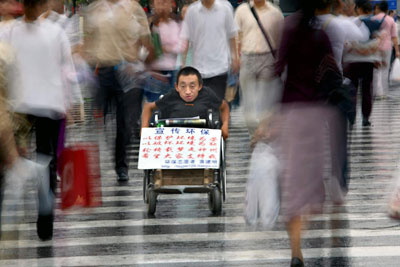
|
|
Zheng's photo of a man campaigning for the environment. Photos courtesy of Zheng Longhua
|
"The most difficult to overcome is the look in the eyes. Many were wondering what happened to me, marrying a man without hands." For many years, she has worked hard to support her family and her husband's photography. She is the director of a local branch of an insurance company.
"Now the looks in their eyes have changed from looking down upon us to looking equally at us," she says. "His success proves my success."
Wang funded her husband's exhibition with 300,000 yuan ($43,000).
"I believe in what he is doing. Each time when I see him laughing, I know he is doing something right, something that really makes him happy," she says.
Zheng says a man should leave some work of value to the world. "I hope my work can be a mirror. The disabled can achieve so much. Looking into the mirror, we, the healthy included, should be more dedicated to our work and dreams."
His ability to inspire is obvious.
Ge Bin, 18, a deaf-mute student from Beijing's Fourth Deaf-Mute School, says in sign language: "I was very sad before I came to the exhibition, but the pictures touched me. I will treasure every minute in life and work hard."
Pointing to a disabled athlete's expression, he says: "I can feel she is going all out!"
Ge's classmate Liu Jianchao, 19, says in sign language: "My hometown is in Sichuan. After the earthquake in May, many people there became the same as us, disabled. The pictures can encourage them to stand up to the odds in life."
Zheng worked at the Disabled People's Federation in Lin'an, Zhejiang province, for several years and is familiar with the struggles and attitudes of the disabled.
Society is increasingly friendly to the disabled and efforts have been made to end discrimination at work and in educational environments.
"But there is still much to do. Much of China's population is having a better life, but many of the disabled are struggling for food and clothing.
"Some want a job instead of sitting idle, waiting for subsidies, but they can't get enough work opportunities," Zheng says.
"Most of the disabled are people like me who work hard with dignity and rely on themselves to make a living," he says.
"The disabled need spiritual support most. A fatal defeat for them is to lose self-confidence."